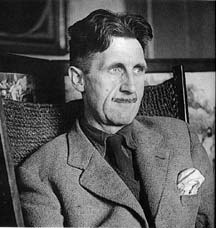Literary Biographies: Understanding or Cheerleading?
There has been a rash of "literary" biographies written in recent years, although it has been somewhat of a mystery to me that many of these biographies have sold more copies than their subjects ever did. I am ambivalent about the whole biography business at best. Does it really improve my understanding of the text that I know certain intimate details of the author's relationship with his mother? Will that information undermine or raise my appreciation for the authors work?
Three writers that have recently been in the news again in regards to biographical sketches have been George Orwell, Philip Larkin and Sylvia Plath.
I have never cared for Plath's work. I first encountered her while taking an undergraduate course entitled "The Young Protagonist" where we read The Bell Jar.Her poetry leaves me a bit cold. And since her one and only theme was "my daddy didn't love me, boo-hoo-hoo"; sticking her head in the oven was, in my estimation, a shrewd career move. There has always been certain cache attached to poet suicides, thus assuring "St. Sylvia" of an afterlife and certain pass on any real scrutiny of her talent. Will reading what a beast Ted Hughes was (and this is in some doubt) change my opinion of her writing? I doubt it. The new movie will surely allow us to witness her ascension into heaven.
Larkin is a prickly case, but one worth reading. The recent publication of his letters reveals that he was a nasty misogynist, racist, and class-conscious snob. Gee, you had to read his letters to figure that out? Although reading "Annus Mirabilis" still brings a smile to my face no matter how many time I read it, I was never under the delusion that I was dealing with anything other than a serious crank. Will I stop reading his work because we now have confirmation by his own hand that he was a flawed human being? Of course not, he was too good a poet not to be read.
Orwell may be the one writer where biography actually helps. He described himself as a "pamphleteer," that is to say he wrote very much in the moment. Although many of his essays such as "Shooting an Elephant" or "Politics and the English Language" hold up after five decades, but many are concerned with the political issues of his day and are perplexing to the contemporary reader. Bernard Crick's biography is by far the most helpful for the serious reader of Orwell in giving context to his more idiosyncratic writing. In a sense, Orwell was a proto-blogger. Christopher Hitchen's uncharacteristically fawning testament Why Orwell Matters, may not always be critically sound, but it informs you as to why Orwell still continues to influence many writers today.
While I have read dozens of these life stories, I can't think of a single instance where it has swayed my opinion of the quality of the subjects work. To know that Louis MacNeice drank twenty pints of Guinness in a single day (I certainly wouldn't want his bar tab!) or that James Joyce had a serious Madonna/whore complex doesn't diminish their accomplishments in my view. Perhaps these books serve a function for those of us who would rather choke than admit reading "People" that we get our share of gossip and titillation too.





0 Comments:
Post a Comment
<< Home